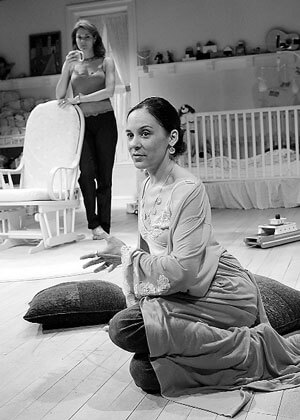A husband hires a hit man in ‘Reckless’; ‘Eve-Olution’ lurches before landing
Figuring out who we are in our mettlesome culture is seldom easy.
Do our roles define us? What power do we have? What is true, and why is the process so complicated?
These are the themes of at least two newly opened plays, Craig Lucas’ “Reckless” and “Eve-Olution,” “co-written” by Hilary Illick and Jennifer Krier. That’s where the similarities end, however, for while Lucas creates a largely engaging comedy that tackles the classic theme of man (or, in this case, woman) against fate, the co-authors of “Eve-Olution” have written parallel monologues of two privileged, affluent women whining about their conscious choices to have children and how inconvenient it can be at times. At its most uneven, “Reckless” remains a warm and human experience, while at its best, “Eve-Olution” is shallow and self-reverential.
In “Reckless,” Lucas starts with the notion of Christmas as that time of year when we are most prone to self-delusion about our lives and how good they are. It opens with Rachel, played brilliantly throughout by Mary Louise Parker, in bed with her husband engaging in a long riff on the happiness she feels about the holiday, how it takes her back to the feelings of her childhood. Her reverie is shattered when her husband announces that he has taken a contract out on her life, and that the killer will be there any moment. Rachel is thrown out into the cold world in a nightgown and fuzzy slippers with nothing else—forced to become effectively reborn and make a new life for herself. Cast out from the trappings and relationships that defined her reality, Rachel discovers that she is certainly not the only one who, having been dealt a bad hand, is on a journey to define herself.
Lucas’ antic and absurdist writing reminds one of Eugene Ionesco, though his situations are more readily accessible, with life coming at characters in huge, bizarre, unrelenting and unmanageable chunks that force them into insanity or surrender. Director Mark Brokaw captures Lucas’ aims with a driving energy that survives the set changes when hordes of unidentifiable forces—i.e., stagehands—shift the shape of the world, often around the actors. There are times when the play bogs down, as in an over-long game show scene, but generally there is a sense of a world running mad around us with very few moments for the characters to simply relate to one another directly and honestly—something that must be seized when the rare chance presents itself.
After focusing on Rachel throughout the play, in the final moments, Lucas throws a disquieting wrench into the works, showing that her reality is finite and that like wave patterns, her actions and choices have touched off reactions beyond her—or indeed anyone’s—ability to conceive.
This is not a huge play, but a comic meditation on the nature of reality and how we cope. Parker plays Rachel with great commitment. The other members of the cast—Michael O’Keefe, Rosie Perez, Debra Monk, Olga Merediz, Thomas Sadoski and Jeremy Shamos—acquit themselves well, though they are largely there as devices surrounding Rachel. This is Parker’s play, and she is a master of the subtle motion and the fluid illumination of character in the smallest moments; she is the human presence in the vortex of incomprehensible events. The production often literally swirls around her, but in her body, voice and ultimate surrender, we see someone who is in the process of coming to terms with the world—who knows that truth is largely ephemeral and that we do the best we can.
Quite the opposite experience is “Eve-Olution.” The play takes two simultaneous tracks, each ripped from your favorite recipe-laden glossy magazine, the kind of drivel one expects from the Lifetime cable network. We are asked to feel for women who on the road to self-definition have decided to become mothers, only to realize that, golly, it’s harder than they thought. Sometimes, even the au pair doesn’t provide enough help. Faced with the choice to take responsibility for their families or focus on themselves and their careers, both women make the same choice—to focus on themselves in the context of their families. And so, we travel from situation to situation in which these women who have exceptional advantages, compared to most women in this world, feel sorry for themselv
Setting aside the abject banality and offensiveness of the subject matter for a moment, this is just bad theater. The characters’ total self-absorption is boring—really boring. They travel a journey that starts with “I’m all about me” and ends with “I’m all about me.” The only exception is that they’ve realized it’s okay to be an emotional mess and there will be times when they endanger their children, but things happen and they’re okay with that. How completely reassuring that is.
The authors have pretended to write a play by shifting the focus back and forth between the two women, though they never acknowledge one another on the stage until the end. Reading the authors’ biographies in the Playbill, it appears these are autobiographical monologues, but the issues are more suited for a clinic than a theater. One does, though, stand in awe of the narcissism that prompted them to think that this is theater worthy to be seen and have hoodwinked some producers into financing for it.
If there is anything to recommend this show, it is the performances of the two actresses. Both Carolyn McCormick and Sabrina LeBeauf are accomplished; present performers, who can, in small moments, make these women compelling and still the urge to fling produce on the stage. LeBeauf, in particular, manages the illogical transitions with grace and focus, and finds several moments that are real and human.
This is a terrible and shallow play, representing one of the most repellant features of our culture—the belief that we can make choices and try to avoid responsibility for the consequences. If the Bush administration hasn’t given you enough of that, you might get some masochistic pleasure from “Eve-Olution.”
Carolyn McCormick, left, and Sabrina Le Beauf are featured in the new play “Eve-olution.”



































